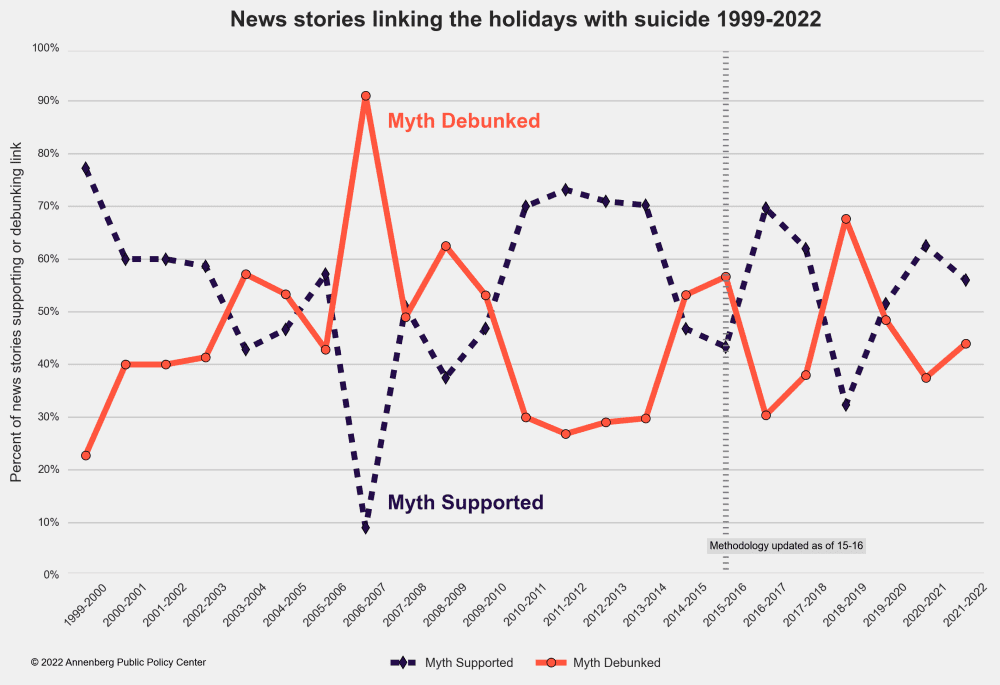That suicide rates spike during the holiday season is something that you’ve probably heard either in the news or during conversation, but new research is exploring how this myth has endured for so long despite data not supporting the claim.
In 2021, provisional data showed rates of suicide increased during the festive holiday months in the US, but this came following two years of declining rates. The truth is that on average, suicide rates during the holiday months are actually some of the lowest in the year.
In light of this, the Annenberg Public Policy Center (APPC) is trying to encourage others to abandon perpetuating the myth. This is because there’s sometimes a contagious effect, so by talking about a spike in suicides around Christmastime and New Year there’s a possibility of influencing someone who is contemplating it.
National recommendations now ask that media outlets and journalists don’t perpetuate the idea that the holidays are associated with a rise in suicides, not only because it can increase contagion, but also because the data doesn’t support it in the first place.
Like most things, annual rates for suicide fluctuate, meaning sweeping statements rarely apply year-on-year. However, if a trend can be drawn in recent years it’s that there are lower rates of suicide during the festive season. That said, people aren’t statistics, and concerns regarding a person’s state of mind should be taken seriously at any time of year.
To see how these national recommendations were being translated in the media, the LexisNexis and NewsBank databases were analyzed for terms like “suicide(s)” and “holiday,” “Christmas,” “New Years,” “increase,” “peak,” and “rise,” across 23 holiday seasons. Researchers then determined if the hits were stories supporting or debunking the myth.

Percentage of news stories mentioning both the holiday season and suicide that support or debunk the holiday-suicide myth. Stories published during the holiday season from 1999-2022. Image credit: Annenberg Public Policy Center.
The results revealed that in most of those years, media stories were supporting the myth (56 percent) more than they were debunking it (44 percent), and this was true too for the 2021 – 2022 season.
“Our experience in tracking news stories about suicide over the holidays shows how difficult it is to stamp out this myth,” said Dan Romer, research director of the Annenberg Public Policy Center in a statement. “In the 23 years of our study, only nine years had higher rates of debunking of the myth, and only three of those occurred in the last 10 years.”
The festive period can be a difficult one, whether that’s linked to the expectations and events tied to certain cultures or the simple fact that some parts of the globe are plummeted into darkness at this time. However, Romer warns that it’s unhelpful to draw false conclusions about how this might influence a person’s risk of dying by suicide.
“For some people, this may be an emotionally fraught time of year,” Romer said. “With stories focusing on the holiday blues, seasonal affective disorder, and other changes in the seasons, there are a lot of factors that would seem to support the myth. There is also a concern for those who have lost friends and family during the year and who may be experiencing sadness about those losses. But we should not assume that these experiences lead people to suicide.”
The research was published by the APCC.
If you or someone you know is struggling, help and support are available in the US at the National Suicide Prevention Lifeline on 1-800-273-8255. For Canada, the Canada Suicide Prevention Service can be called 24/7 on 1.833.456.4566 or text 45645. In the UK and Ireland, the Samaritans can be contacted on 116 123. International helplines can be found at SuicideStop.com.
Source Link: "Suicides Spike During The Holidays" Is An Unhelpful Myth The Media Must Ditch